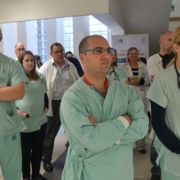Security & the Healthcare Industry
SHAFFER SECURITY GROUP is asked to comment on the current state of hospital security in the U.S.:
Multiple entry points, radioactive machinery and materials, controlled substances, immobile patients/hostages, high-value equipment, open 24-hours, are just some of the reasons why U.S. hospitals are prime targets for terrorism. Greg Shaffer, founder and managing partner of SHAFFER SECURITY GROUP, was asked to provide insight on the current state of hospital security in the United States.
The article below details some of the changes that need to be made in the healthcare industry:
First Things First…
Provide training for all hospital personnel! I know, this is a daunting task due to multiple shifts, surgeries, unexpected emergencies, staffing schedules, etc. However, it is critical that every doctor, nurse, maintenance personnel and staff understand security is a critical function. These meetings (and there will be more than one as a result of the various work-shifts) must be attended and addressed by the Hospital Administrator or CEO. It MUST be communicated from the top down, that security is now a priority. Everyone should know a corporate mandate has been issued stating security is second only to a patient’s well-being.
Each employee must believe they are the most important cog in the the security plan. Senior management then needs to develop a “portal” or a mechanism in which the employees can communicate their security concerns and observations of suspicious behavior.
Once the “portal” has been established, the person or department in which is receiving these security calls or reports, must know exactly what to do and who to dispatch to address these concerns.
Intervention Capable Response:
Every hospital in the United States should have an armed security response team. A team of highly skilled, experienced, professional security officers – not a $15.00/hour, uniformed, armed security guard! A “Intervention Capable Response” team that can help a patient across the street, and take out an active shooter at 50-yards!
A budget must include funds for quarterly training, both on the firearms range and in the classroom.
So much more we can do,
There is so much more that can be done to secure our nation’s hospitals. The amount of radioactive materials and controlled substances (drugs) in our hospitals should dictate a change in our paradigm.
Shot location detectors; better video-surveillance; better situational awareness training for the staff; limiting the number of entrances; establishing “shelter-in-place” rooms; drop-down walls and automatic locking doors to isolate an active shooter; and good perimeter (parking lot) security are just a few things.
Shaffer Security Group
Our experienced and professional staff can help you design, implement and manage your hospital security plan. Call for a free assessment and consultation.


